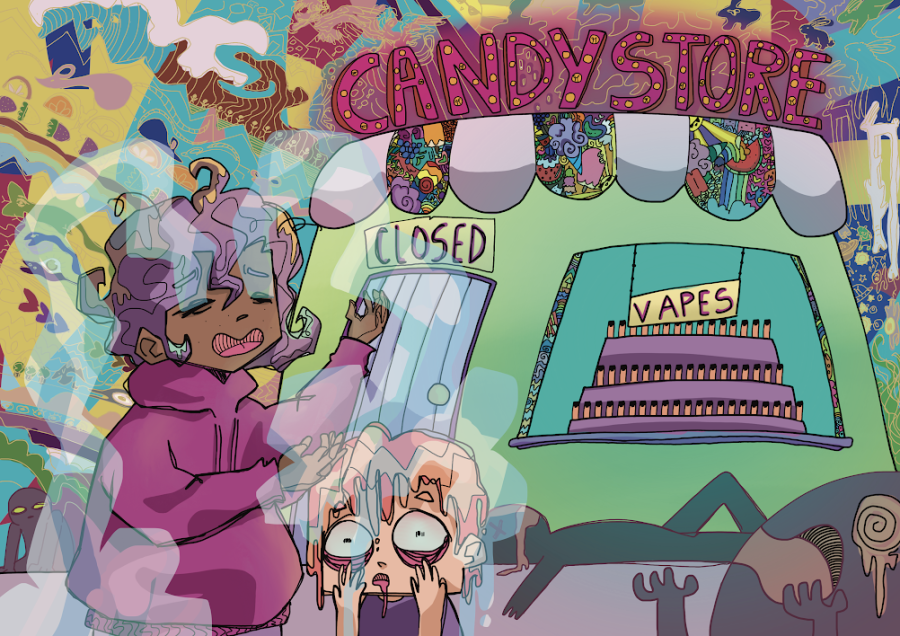Flavored tobacco ban upheld
School’s vaping problem may improve as a result of new law
Students have the air knocked out of them by the closing of the vape shop.
Vaping in the bathroom has long been perceived by some as the coolest way to hang out at Cal High.
But this entrenched tradition may be threatened by California Senate Bill 793, which bans the sale of flavored tobacco.
Cal’s bathrooms are notorious for vaping. The hazy air, artificially sweet smell and hushed feet behind stall doors are a familiar sight to any student. But when California voters overwhelmingly supported the ban as part of Proposition 31 in the November election, the popular flavored tobacco products are going to be much hard to come by.
Targeting minors, the new state law prohibits the sale of flavored e-cigarettes, menthol cigarettes, and flavor enhancers for tobacco products that especially appeal to teens.
About 2.14 million teens, or around 14.1 percent of high schoolers, used e-cigarettes during the fall of 2022, according to the US Food and Drug Administration.
The US Surgeon General warns that e-cigarettes and other flavored tobacco products can result in long-term addiction because they contain harmful substances such as nicotine.
Under SB 793, retailers and manufacturers who sell flavored tobacco products such as e-cigarettes will be fined $250. But those who purchase or possess flavored tobacco products aren’t penalized.
The bill was supposed to take effect in 2021, but it was suspended because of a referendum campaign by big tobacco companies such as Phillip Morris and RJ Reynolds, Cal High’s Tobacco Use Prevention Education (TUPE) Coordinator Patricia Mullin said.
State voters overwhelmingly supported upholding the law during the election on Nov. 8.
Students who use flavored tobacco say the ban limits their reach of the flavored tobacco products they used to smoke. One anonymous junior girl who smokes acknowledged that the ban may even help her quit by making flavored tobacco harder to access.
“I’ve used flavored tobacco products for about a year now,” the junior girl said. “Hopefully I’ll stop using tobacco as much because of it.”
An anonymous senior boy who smokes flavored tobacco feels like the ban is just another obstacle in the way of obtaining it.
“I have used flavored tobacco products since I was about 16,” he said. “The ban does kind of affect me because it’ll be less easy to get [flavored tobacco products], but there are still ways around it.”
Other students share this sentiment, while others hope it will students quit smoking.
“Hopefully [the ban] will have a positive effect on minors by limiting their reach, as well as reducing the appeal,” said Shreya Sharma, a freshman and youth ambassador for the National Coalition Against Prescription Drug Abuse (NCAPDA). “However, as is the case with most drugs, those who are addicted will find one way or another to get their hands on a supply.”
Added sophomore Billy Piggott, “I think [the ban] will make it more difficult to acquire tobacco. But I think that there are people here who would still be able to get their hands on it.”
Junior Julia Maldonado said she believes the new bill is redundant with laws that already don’t stop students from vaping.
“[Tobacco] is obviously not allowed already, so if there is a ban I can’t see why it would stop them,” Maldonado said.
But other students such as freshman Shreeya Nawathe remain optimistic that things will improve.
“I feel like the [flavored tobacco] ban was a good decision because it might stop the [drug] addiction of some students,” Nawathe said.
The California Department of Public Health reports that most youth believe that flavoring is the leading reason why teens use tobacco products. The flavoring masks the off-putting taste of tobacco, making it easier for youth to consume.
“It feels more tempting to smoke [tobacco] because the flavors smell good and taste good for the youngsters,” Cal PE teacher Vivian Hermosillo said. “I’m [in support of] getting tobacco away from young individuals.”
Banning the sale of these products aims to make smoking and vaping less appealing to teens, potentially reducing youth addiction. As an added bonus, it could help make Cal’s bathrooms more hospitable.
“Kids are really attracted to flavors and colors,” campus supervisor Chris Torrey said. “If you take that all away it’s not as enticing.”
Cal’s staff and campus supervisors have tried different approaches to tackle the issue of students vaping on campus. Torrey and other campus supervisors conduct regular sweeps of the bathrooms to check if students are doing what they are not supposed to.
They believe that the ban will allow students to let go of tobacco products because of the lack of flavoring.
“Ultimately, the more we can prevent, or at least delay tobacco use among young people, the less likely a young person will try tobacco and face possible nicotine addiction,” Mullins said.
SB 793 will bring a reduction in tobacco tax revenues to the state, but supporters argue that this will be balanced out by MediCal savings and increased economic activity. Because money won’t be spent on manufacturing flavored tobacco products anymore, Tobacconomics predicts that there will be a net increase of $336.6 million in the state’s local income and sales tax revenues.
News editor Andrew Ma and staff writer Tanvi Pandya contributed to this story.

Junior Mansi Swaminathan is returning for her third year with The Californian, now as Managing Editor. Her main goals for the paper this year are to get...









